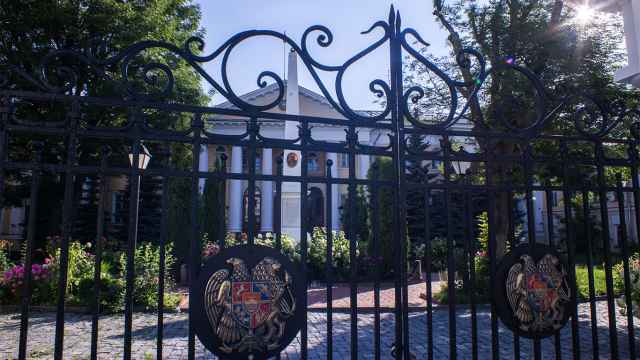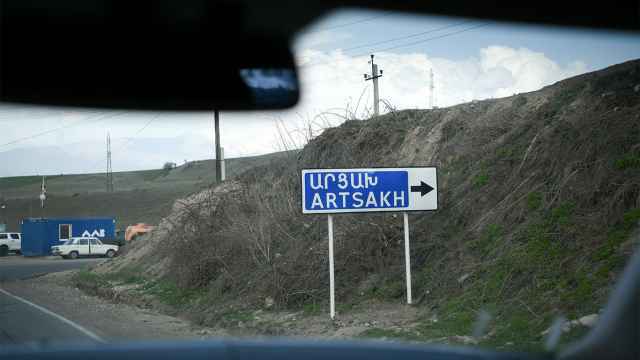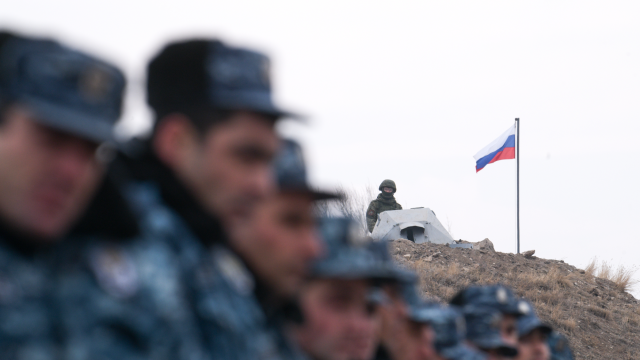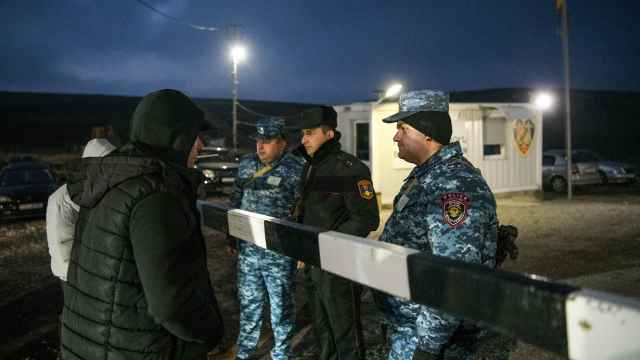The ongoing violence between Armenia and Azerbaijan over Karabakh has already become the most serious escalation of fighting since the 1994 ceasefire. That freezing of hostilities came as a result of mediating efforts by multiple countries, but Russia played the lead role.
More than 16 years later Russia remains the only country capable of single-handedly compelling Armenia and Azerbaijan to end the conflict. Yet, while repeatedly issuing calls for a ceasefire in various unilateral and multilateral formats, Russia has been so far unwilling to back its calls with credible promises of deeds that Moscow would need to take to compel the sides to lay down arms, even if only temporarily.
I think it is time for Russia to use its formidable leverage to bring Azerbaijani and Armenian diplomats to the negotiating table, even if a ceasefire is the only deal they can now discuss as almost two weeks of fierce fighting have probably made a lasting peaceful resolution of the conflict over Karabakh unattainable in the near future.
The Kremlin should also use its resources to put pressure on Turkey, whose direct military support for Azerbaijan includes the deployment of pro-Turkish Syrian jihadists, is unprecedented for part of post-Soviet Eurasia, which Russia has declared to be a zone of its privileged interest. These actions will be in Russia’s national interests for three reasons, in my view.
Every additional day of fighting is fraught with escalation that could make the Kremlin’s current approach of being equidistant to Armenia and Azerbaijan untenable. If the fighting continues and escalates, making one side closer to prevailing over the other, Russia would have to choose from two unpalatable options: either side with Armenia and ‘lose’ Azerbaijan, or vice versa.
Moreover, if it chooses to side with Azerbaijan, Moscow would see its reputation as a reliable military ally, which it has burnished in Syria, seriously damaged. In fact, I wonder if that reputation is already being doubted by some of Russia’s allies in the Collective Security Treaty Organization (CSTO).
After all, it can not have escaped their attention that even participating in all of the Russian-led integration projects in post-Soviet Eurasia, including CSTO, like Armenia does, does not prevent Moscow from being “equidistant” to you and your adversary. That’s still the case if the latter has initiated hostilities against you and, unlike you, is not Russia’s military ally.
Second, Turkey’s decision to get militarily involved in the conflict by sending its proxies to fight on Baku’s side, deploying F-16s to Ganja and providing material support for the Azerbaijani military represents the first time an external power has become militarily involved a conflict in parts of post-Soviet Eurasia.
If the Russian leaders do, indeed, see post-Soviet Caucasus as part of what they describe as a zone of privileged interest, then Turkey’s intrusion into it should be not just a matter of grave concern, but also a reason for Russia to act. (In fact, Karabakh has become a third region, where Turkish proxies are fighting against Russia’s allies, after Syria and Libya.)
Third, the participation of jihadists in hostilities on Russia’s borders should also be treated as a crossing of a Russian red line. And don’t take my word for it. An advisor to the Russian president’s Security Council has said so.
“If direct participation of the Turkish military or militants from Syria is proven, that will be a red line,” said Alexander Dynkin, president of Russia’s Institute of World Economy and International Relations and member of the scientific advisory board of the Security Council.
Dynkin’s “if” would appear redundant to anyone who has time to take a cursory look at recent reporting by such respected news organizations, as Reuters, the Guardian, and RFE/RL.
Сhief of Russia’s own foreign intelligence Sergei Naryshkin has even listed which jihadist groups have delegated their fighters to participate in combat on Baku’s side, saying that “we are speaking about hundreds or even thousands of radicals prepared to win earnings in the new Karabakh war.”
The presence of jihadists in a country that borders Russia’s North Caucasus should be of great concern to Russia. After all, one of the goals of Russia’s intervention in Syria was to prevent jihadists turning their gaze toward Russia upon ousting Assad and establishing a Caliphate there.
It follows then that the Kremlin should have even less tolerance for the same jihadists being across the border from its North Caucasus, which has accounted for more anti-state violence in post-Soviet Russia than any other region and been home to scores of al-Qaeda and Islamic State loyalists, some of whom even proclaimed the establishment of an ISIS vilayat there.
The Kremlin’s discontent with this development is borne out by multiple Russian official statements, including one from the Foreign Ministry that describes the presence of foreign rebels in Azerbaijan as “inadmissible.”
However, we have so far seen no actions from Russia to compel these jihadists to disengage and leave the South Caucasus. Russia should put meaningful pressure on Turkey so that it will at the very least withdraw these jihadists.
So far Turkey has shown no signs of being willing to do so, but perhaps it would change its mind if Russia signaled that it would be prepared to impose economic and other costs on Turkey if it doesn’t withdraw its proxies.
Turkey, which is already suffering from a weak economy, exports more than 4 billions dollars worth of produce and other goods to Russia annually, so it would probably pay attention if Russia acted like it did in 2015, curtailing imports from Turkey to punish Ankara for shooting down a Russian warplane, forcing Turkish President Recep Erdogan to apologize and seek to mend fences.
Yes, such sanctions could cost Russia, which exports billions of cubic meters of gas to and via Turkey. However, Kremlin’s interest in ending Turkey’s military involvement in what Russian leaders insist is a zone of their country’s privileged interests would trump the desire to avoid economic costs.
The need to defend Russia’s national interests should also trump whatever reluctance Putin may be feeling on a personal level to do something that would be interpreted as support for Nikol Pashinyan who has sought to place Putin’s friend and ex-president of Armenia Robert Kocharyan behind bars and keep him there in spite of signals from Putin not to do so.
Putin’s Russia is not the only country that should be not only concerned with the continuing fighting over Karabakh with the involvement of Turkish-sent jihadists, but also act on its concerns.
As news reports indicate, the United States has helped to train and equip some of them. We all remember what some of the rebels that U.S. helped to train and equip to fight against the Soviets in Afghanistan ended up doing in the 1990s-2000s. More importantly, it cannot be in U.S. interests to see jihadists, including past and present associates of Islamic State, al-Qaeda, and their affiliates, establish a presence in yet another country.
Yet, when it comes to mediating a ceasefire between Armenia and Azerbaijan, “Trump is nowhere to be seen,” as Washington Post columnist David Ignatius lamented back in September and again in October.
America’s small, but powerful ally Israel should also be concerned with Turkey’s behaviour and act on its concern. If Turkey is indeed a greater threat to Israel than Iran to per Yossi Cohen of Mossad’s view, then why arm Turkey’s closest ally whose gains vis-a-vis Armenia, if they become reality, would strengthen Turkey’s geopolitical clout?
If the U.S. and its allies were to throw their weight behind a meaningful Russian initiative to discontinue the Armenian-Azeria hostilities and make Turkey — a U.S. ally in NATO — withdraw its proxies and back that initiative with credible promises of economic sanctions and other punitive actions, then this war would be over soon.
Going forward, once the ceasefire is achieved, perhaps, it will be time for Russia to take time and rethink its current approaches to the Armenian-Azerbaijani conflict. As one of Russia’s best foreign policy experts Fyodor Lukyanov has observed, Russia’s long-time approach towards maintaining status-quo over Karabakh by convincing both sides they cant prevail in war no longer works. “Hence, Russia needs to give it serious thought what is that it actually wants” vis-à-vis the two countries and the region as a whole, Lukyanov said. I cannot agree more.
A version of this article was first published in https://saradzhyan.wordpress.com/
A Message from The Moscow Times:
Dear readers,
We are facing unprecedented challenges. Russia's Prosecutor General's Office has designated The Moscow Times as an "undesirable" organization, criminalizing our work and putting our staff at risk of prosecution. This follows our earlier unjust labeling as a "foreign agent."
These actions are direct attempts to silence independent journalism in Russia. The authorities claim our work "discredits the decisions of the Russian leadership." We see things differently: we strive to provide accurate, unbiased reporting on Russia.
We, the journalists of The Moscow Times, refuse to be silenced. But to continue our work, we need your help.
Your support, no matter how small, makes a world of difference. If you can, please support us monthly starting from just $2. It's quick to set up, and every contribution makes a significant impact.
By supporting The Moscow Times, you're defending open, independent journalism in the face of repression. Thank you for standing with us.
Remind me later.








